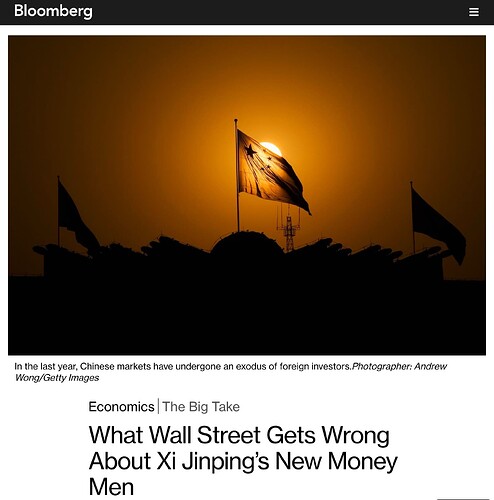-
中国即将迎来几十年来最大的一次改组,一代受国际尊重的经济官员将下台,为一群与习近平主席关系密切的新政治家让路。这引起了全球大国的关注,因为他们担心新政府将导致更多的国家干预和国际孤立。
-
然而,还有一种观点认为,来自高层的信任、在中国政治体系中的经验以及务实的决策方法比经济资质更重要。这可能意味着,新团队可能比他们的前任更有能力推动所需的改革。
-
3月5日开始的全国人民代表大会是一个值得关注的关键事件,因为它将设定GDP增长目标(可能在5%左右),减少财政赤字,并可能包括对政府机构的调整。
-
彭博经济学预测,如果中国实施正确的改革,与美国保持稳定的贸易和技术联系,并解决人口老龄化问题,他们的经济增长到2030年可以达到平均5%。然而,如果他们不能这样做,经济增长可能滑落到2%,让美国成为世界上最大的经济体。
-
即将到来的中国领导人阵容使西方观察家感到悲观,因为李克强总理即将离开,由习近平的前办公室主任李强接替。哈佛大学毕业生、副总理刘鹤也将离开,由何立峰接替,他被考虑担任银行的共产党书记。中央银行行长易纲被朱鹤新取代,朱鹤新是一位资深的银行家,学术资历不深。
-
何立峰和朱鹤新与习近平相识四十多年,都是从地方政府升上来的。李强曾负责在新冠疫情大流行期间对上海进行严格封锁。刘鹤在2013年提出了一个议程设置,呼吁市场在中国经济中发挥 "决定性 "作用。易纲是著名的 “学者型官员”,在美国教授经济学。
-
1978: 邓小平的开放政策引入了市场自由化和全球参与。
-
1990年代末。朱镕基的国营企业改革
-
2001年:中国加入世界贸易组织
-
2007-8年:全球金融危机削弱了北京对自由市场模式的信心
-
2013: 习近平以 "中国制造2025 "和 "共同富裕 "等举措确认了左倾的趋势
-
接下来是镇压香港的抗议者
-
以及新疆的侵犯人权行为
-
后来便是与俄罗斯的战略伙伴关系揭开序幕
-
外国投资者对中国的前景持悲观态度,原因是10月的党代会,习近平赢得了第三个任期,并将他的同僚安排到关键岗位。然而,由于统一的团队可能是有效的,并且取消了新冠疫情限制,股票开始复苏。
-
这种市场逆转说明了对中国领导层黑白分明的解读的弊端。邓小平因自由化而受到赞扬,但他也推出了独生子女政策,朱镕基关闭了小型国有企业,但也旨在创造国有企业的冠军。
-
私营企业在习近平领导下蓬勃发展,其市场价值从10%上升到40%以上。然而,彼得森研究所的分析显示,这一比例在这一时期末逐渐下降。
-
在习近平主席的领导下,中国已经放宽了对外国直接投资的限制,允许外国银行在中国有更大的业务,并取消了外国汽车公司的合资合作要求。彭博经济社预测,中国的年经济增长率将接近5%。
-
花旗集团分析师预测,李强的政策风格将是亲商、相对自由和务实的。政策变化与其说是克服国有企业的阻力,不如说是赢得数百万公民的支持。这将是提高退休年龄和继续促进增长的城市化所需要的。
-
中国最大的增长挑战是其工作年龄人口的萎缩,到2050年将下降到5.5亿。因此,推迟领取养老金的年龄是习近平新领导班子的一个优先事项,尽管这在公民中不受欢迎。
-
数以亿计的农民工和农村居民仍然面临着他们可以居住的障碍,但对许多人来说,随着生活成本的上升,大城市的吸引力正在消退。习近平的新团队将需要通过提高高收入者的税收,为改善教育和医疗保健提供资金来扭转这一局面。政策转变往往是由环境而非意识形态驱动的,习近平在第一个任期开始时就全力以赴地致力于市场改革,但却遭遇了一系列的危机。
-
在北京的眼中,美国作为效仿对象的吸引力也已经消退。归根结底,重要的是,习近平觉得能够给他的新团队提供解决复杂问题的空间,而且他们有勇气完成任务。自从习近平在10月开始他的第三个任期以来,有迹象表明支持增长的务实主义再次占上风,新冠清零控制被取消,刘鹤大肆宣传对企业家的支持,一位高级官员访问了阿里巴巴。
-
彭博经济学预测,中国2023年的GDP将增长5.8%,新冠疫情限制的结束提供了一次性的推动。即使有最聪明的政策组合,由于高额的债务和令人沮丧的人口统计学,这种增长速度也无法维持。习近平的新团队可以通过一些好的决定避免过于急剧的下滑。
-
China is about to see its biggest reshuffle in decades as a generation of internationally respected economic officials step down to make way for a new group of politicians with strong ties to President Xi Jinping. This has caused concern from global powers, as they fear the new government will lead to more state intervention and international isolation.
-
However, there is an alternative view that suggests that trust from the top, experience in China’s political system, and a pragmatic approach to policymaking are more important than economic credentials. This could mean that the new team may be better placed than their predecessors to push through the needed reforms.
-
The National People’s Congress, which begins on March 5th, is a key event to watch as it will set the GDP growth target, likely at around 5%, reduce the fiscal deficit, and may include a shake-up of government agencies.
-
Bloomberg Economics predicts that if China implements the right reforms, maintains steady trade and technology ties with the US, and addresses the aging population issue, their economic growth could reach an average of 5% by 2030. However, if they fail to do so, growth could slip to 2%, leaving the US as the world’s biggest economy.
-
The incoming line up of Chinese leaders is causing Western observers to be pessimistic as Premier Li Keqiang is leaving and is being replaced by Xi’s former chief of staff, Li Qiang. Harvard graduate and Vice Premier Liu He is also leaving and is being replaced by He Lifeng, who is being considered for the role of Communist party secretary at the bank. Central bank governor Yi Gang is being replaced by Zhu Hexin, a veteran banker with less extensive academic credentials.
-
He Lifeng and Zhu Hexin have known Xi for more than four decades and have risen from local government. Li Qiang was responsible for the strict Shanghai lockdown during the Covid-19 pandemic. Liu He made an agenda-setting call for the market to play the “decisive” role in China’s economy in 2013. Yi Gang is a renowned “scholar official” and taught economics in the US.
-
1978: Deng Xiaoping’s open-door policy introduced market liberalization and global engagement
-
Late 1990s: Zhu Rongji’s reform of state enterprises
-
2001: China joined the World Trade Organization
-
2007-8: Global financial crisis weakened Beijing’s confidence in free market model
-
2013: Xi Jinping confirmed lurch left with initiatives such as “Made in China 2025” and “common prosperity” drive
-
Suppression of protestors in Hong Kong
-
Human rights abuses in Xinjiang
-
Strategic partnership with Russia unveiled
-
Foreign investors had a pessimistic outlook on China’s prospects due to the October Party Congress, where Xi won a third term and installed his associates in key positions. However, stocks began to recover due to the unified team potentially being effective, and the Covid restrictions being lifted.
-
This market reversal speaks to the shortcomings of black and white readings of China’s leadership. Deng Xiaoping was praised for liberalization, but he also introduced the one-child policy, and Zhu Rongji closed small state firms but also aimed to create state champions.
-
Private sector firms have flourished under Xi, with their market value rising from 10% to over 40%. However, analysis from the Peterson Institute shows the share edging down at the end of the period.
-
Under President Xi Jinping, China has relaxed restrictions on foreign direct investment, allowed foreign banks to have a larger presence in the country, and removed the requirement of joint venture partnerships for foreign car companies. Bloomberg Economics predicts China will have annual economic growth near 5%.
-
Citigroup analysts predict that Li Qiang’s policy style will be pro-business, relatively liberal, and pragmatic. Policy change is less about overcoming the resistance of state enterprises than winning over millions of citizens. This will be needed to raise the retirement age and to continue growth-boosting urbanization.
-
China’s biggest growth challenge is its shrinking working-age population, which is set to drop to 550 million by 2050. Therefore, pushing back the pension age is a priority for Xi’s new leadership team, though it is unpopular with citizens.
-
Hundreds of millions of migrant workers and rural dwellers still face barriers to where they can live, but for many, the appeal of the big city is fading as living costs rise. This is something Xi’s new team will need to reverse by raising taxes on high earners to fund improvements in education and healthcare. Policy shifts are often driven by circumstance rather than ideology, with Xi starting his first term with a full-throated commitment to market reform only to be met with a series of crises.
-
The appeal of the US as a model to emulate has also faded in Beijing’s eyes. In the end, it’s important that Xi feels able to give his new team the space to deliver solutions to complex problems, and that they have the grit to get things done. Since Xi’s started his third term in October, there are signs that pro-growth pragmatism is in the ascendency once more, with Covid Zero controls lifted, Liu He trumpeted support for entrepreneurs and a senior official visited Alibaba.
-
Bloomberg Economics forecasts China’s GDP to grow 5.8% for 2023, with the end of Covid lockdowns providing a one-off boost. Even with the smartest policy mix, this pace of growth cannot be sustained due to the high debt and dismal demographics. Xi’s new team can avoid too sharp a slide with some good decisions.
